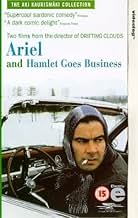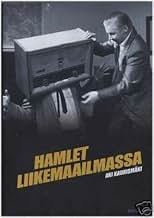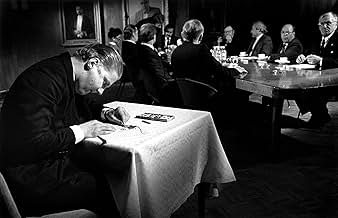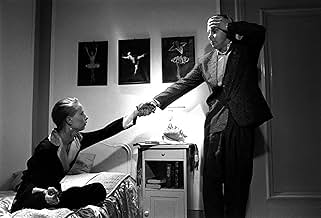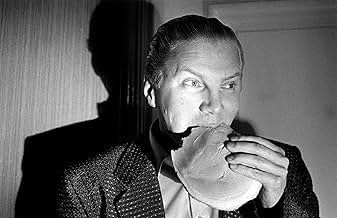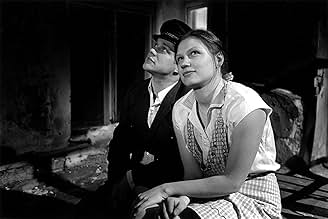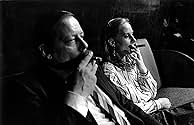Hamlet liikemaailmassa
- 1987
- 1h 29m
IMDb RATING
6.8/10
2.6K
YOUR RATING
Playboy Hamlet sees the ghost of his father, a paper baron in today's Finland.Playboy Hamlet sees the ghost of his father, a paper baron in today's Finland.Playboy Hamlet sees the ghost of his father, a paper baron in today's Finland.
- Director
- Writers
- Stars
- Awards
- 1 win total
Puntti Valtonen
- Simo
- (as Hannu Valtonen)
- Director
- Writers
- All cast & crew
- Production, box office & more at IMDbPro
Featured reviews
Like I wrote before reviewing Drifting Clouds, the actors in Kaurismäki's movies are very stiff. There's basically no emotion in the acting comparing to Hollywood movies. During Drifting Clouds I wasn't a big fan of that style, but it suits Hamlet Goes Business. It gives a certain contrast to the somewhat theatrical dialogue and the fact that this is based on a play.
Also I was surprised to see how good Pirkka-Pekka Petelius was as Hamlet. He's mostly famous for being a comedian in many sketch shows, and this is honestly the first serious role I've seen him play. Of course this is a black comedy, a spoof of Hamlet, so the role is still not entirely serious.
While I love most things about this movie, it's that ending that kind of bothers me. After seeing this film several times I'm already used to it, but it still feels very separate from the rest of the movie. It's added by Kaurismäki, which might explain that. I could go into lengths what bothers me about this, but I'd rather not make this review sound exactly like the analysis we did in class, and also I don't want to spoil you.
The music chosen for this movie is amazing. The classical music and rock music go very well together. Most of the time there's a great harmony with what we see and what we hear, but even when there's not, it' amazing. And oh, the cinematography... Weird angles and crooked shots are so great. And of course the whole movie being in black and white amplifies the whole feeling. With colours, it wouldn't be the same film.
Hamlet Goes Business is an amazing take on Hamlet, and a great satire on business world. While it's clear I will not like all of Kaurismäki's movies, I can appreciate his work and I'm glad I've found a favourite
Also I was surprised to see how good Pirkka-Pekka Petelius was as Hamlet. He's mostly famous for being a comedian in many sketch shows, and this is honestly the first serious role I've seen him play. Of course this is a black comedy, a spoof of Hamlet, so the role is still not entirely serious.
While I love most things about this movie, it's that ending that kind of bothers me. After seeing this film several times I'm already used to it, but it still feels very separate from the rest of the movie. It's added by Kaurismäki, which might explain that. I could go into lengths what bothers me about this, but I'd rather not make this review sound exactly like the analysis we did in class, and also I don't want to spoil you.
The music chosen for this movie is amazing. The classical music and rock music go very well together. Most of the time there's a great harmony with what we see and what we hear, but even when there's not, it' amazing. And oh, the cinematography... Weird angles and crooked shots are so great. And of course the whole movie being in black and white amplifies the whole feeling. With colours, it wouldn't be the same film.
Hamlet Goes Business is an amazing take on Hamlet, and a great satire on business world. While it's clear I will not like all of Kaurismäki's movies, I can appreciate his work and I'm glad I've found a favourite
What are you left with if you take most of the psychological motivations away from characters, and turn a story into a social tract? Shakespeare lovers and those who persist on "character development" better beware, as Kaurismaki (in my fourth incursion into his cinema) transforms the Danish prince into a horny, ruthless and spoiled rich heir, who writes bad poetry, is worried about his weight and has a terrible secret. I admit I don't like William Shakespeare much --I believe he's overrated-- so I rather enjoyed Kaurismaki's "irreverence". It is a hint that he does not even give credit to Shakespeare: this story has been told since late 12th century and apparently Thomas Kyd wrote a "Hamlet", before Shakespeare. Kaurismaki is more interested in speculating what may happen to a family like Hamlet's in contemporary settings that seem peculiarly outdated. The first 70 minutes tell the story we know, with a few licenses that in most cases are funny, or simply reveal how the rich and powerful take ruthless decisions without considering their effects on the people they rule. Kaurismaki builds scenes and sequences using resolute ellipsis, a fixed camera, and alienating and ironic music commentaries. Scenes are often resolved in a single take, and to the point (for example, the only time he sees the ghost of his father, Hamlet asks him to talk fast because he does not want to miss dinner, and Kaurismaki cuts to another scene; also there is no famous soliloquy), which made my somewhat uneasy viewing a fast experience. In an aftermath we have never heard of before, Kaurismaki grabbed my full attention, up to his sarcastic end credits against a montage of a factory while a trite tune of hope fills the soundtrack. I found it far more interesting than Brannagh's and Zeffirelli's films.
Released in 1987 and therefore a fairly early effort by Aki Kaurismäki, HAMLET LIIKEMAAILMASSA ("Hamlet Goes Business") is the Finnish auteur's idiosyncratic adaptation of Shakespeare's classic play. Kaurismäki sets the drama in the corporate world of 20th-century Finland: a business magnate (Pentti Auer) is murdered by his wife Gertrud (Elina Salo) and brother Klaus (Esko Salminen) so that they can marry and take over the group of companies. The deceased's son Hamlet (Pirkka-Pekka Petelius), depicted here as something of a dim-witted manchild, discovers the dark secret of his murder and moves towards revenge. At the same time, he maintains a curious love affair with Ofelia (Kati Outinen), daughter of a high-ranking employee, and also scrapes with other characters drawn ultimately from Shakespeare's play.
All of the main scenes from Shakespeare's play are present here, though sometimes (like the murder of Polonius) they don't make much sense in the context of the adaptation and are shown briefly to simply telegraph them. The dialogue is mainly original, though at times it switches into the traditional Finnish translation of Shakespeare's Elizabethan English to deliberately bizarre effect. There is however a laugh-out-loud twist ending going beyond the Shakespearean source material, which turns the film into a commentary on Finnish politics and labor relations.
All of Kaurismäki's films are dark comedies, though with humor so deadpan it is sometimes easy for an audience to miss it entirely. Riffing on the image of the Finnish people as taciturn and emotionless, Kaurismäki's actors are directed to state their lines in a very dry, robotic fashion. The death of Ophelia, a tragedy for the ages, is depicted here in a humorous way entirely due to Kati Outinen's deft facial expression and an unusual prop I won't spoil here. Kaurismäki's love of early rock 'n' roll and blues is present in all of his movies, and you can also expect to see a jukebox kicked into life here and a band performing on stage at some point.
While I am a fan of Kaurismäki and have seen nearly all of his many films, I don't think this is one of his major efforts. The black and white photography is a weak point. Kaurismäki loves utterly drab scenery and it is a big part of his aesthetic, but paradoxically color is necessary to bring this drabness across. It also feels like this is just one more adaptation of Hamlet, even if it's an unusual one, and none of the characters are as readily likable as in Kaurismäki's own original work. Most audiences will find his preceding effort VARJOJA PARATIISISSA (Shadows in Paradise) or his following film ARIEL to be more charming and visually seductive.
All of the main scenes from Shakespeare's play are present here, though sometimes (like the murder of Polonius) they don't make much sense in the context of the adaptation and are shown briefly to simply telegraph them. The dialogue is mainly original, though at times it switches into the traditional Finnish translation of Shakespeare's Elizabethan English to deliberately bizarre effect. There is however a laugh-out-loud twist ending going beyond the Shakespearean source material, which turns the film into a commentary on Finnish politics and labor relations.
All of Kaurismäki's films are dark comedies, though with humor so deadpan it is sometimes easy for an audience to miss it entirely. Riffing on the image of the Finnish people as taciturn and emotionless, Kaurismäki's actors are directed to state their lines in a very dry, robotic fashion. The death of Ophelia, a tragedy for the ages, is depicted here in a humorous way entirely due to Kati Outinen's deft facial expression and an unusual prop I won't spoil here. Kaurismäki's love of early rock 'n' roll and blues is present in all of his movies, and you can also expect to see a jukebox kicked into life here and a band performing on stage at some point.
While I am a fan of Kaurismäki and have seen nearly all of his many films, I don't think this is one of his major efforts. The black and white photography is a weak point. Kaurismäki loves utterly drab scenery and it is a big part of his aesthetic, but paradoxically color is necessary to bring this drabness across. It also feels like this is just one more adaptation of Hamlet, even if it's an unusual one, and none of the characters are as readily likable as in Kaurismäki's own original work. Most audiences will find his preceding effort VARJOJA PARATIISISSA (Shadows in Paradise) or his following film ARIEL to be more charming and visually seductive.
Hamlet Goes Business (1987) is a number of things. On the one hand, it's a piercing satire on industry and the corporate world of the 1980's dressed up as a spiralling melodrama; while on the other hand, it's an appropriation of the colourless, academic world of Shakespeare slapped around and recast as a lurid film-noir pastiche. For me, it's perhaps the first true masterpiece from Finish auteur Aki Kaurismäki; the one in which his typically unique style of deadpan humour, dry characterisations and idiosyncratic reference-points finally came together to create a unique and distinctive whole. Obviously, that isn't to say that his first three films, Crime and Punishment (1983), Calamari Union (1985) and Shadows in Paradise (1986) don't warrant serious critical attention, because they do; but rather, the subtle shades of character, drama, humour and self-reference that had been slowly developing over the course of those particular three films is finally refined and further developed with this delightful, absurdist joy.
The basic story of the film retains the set-up and characters familiar from Shakespeare's adaptation, though with a number of separate abstractions beyond those presented by the general updating of the characters and text. For example, rather than being the noble prince, Kaurismäki's Hamlet is a spoilt, oafish brat; more likely to be getting a hankering for a midnight feast and failing to score with his girlfriend Ofelia than prospering in the cut-throat world of business. In our introduction to the character, a nonplussed Hamlet literally stumbles across the body of his murdered father whilst precociously munching on a large slice of ham. Later in the film, as his step-father and mother conspire to take control of the business, a childlike Hamlet is placated in the boardroom by the addition of his own table with colouring books and felt-tip pens. As a work of satire, both on the idea of industry and on the nuts-and-bolts of Shakespeare's text, Kaurismäki is merciless. However, the film also impresses on a purely stylistic level; with the director adapting certain visual quirks and techniques familiar from post war B-cinema alongside his usual stylistic preoccupations to create one of the greatest pop-cinema pastiches since Godard's Pierrot le fou (1965).
As ever with the films of Kaurismäki, Hamlet works as a result of the perfect casting, with a fantastic performance from lead actor Pirkka-Pekka Petelius complimenting Kaurismäki's regular troop of supporting actors, here including Esko Salminen, Kati Outinen, Esko Nikkari, Turo Pajala and Matti Pellonpää. Petelius's Hamlet maintains that typically straight-faced approach shared by many of Kaurismäki's iconic characters, whilst also possessing something of a childlike innocence to set-up the mechanics for that blistering final act. I can certainly see why some viewers would find the more freely adapted elements of the film offensive on a historical level - with Hamlet here recast as a sulky teen bumbling into a conspiracy that he doesn't quite comprehend - but I think it's important to look beyond the presentation of the character found in the more recognisable elements of the Shakespearean piece to see the bold and imaginative use of satire and stark sense of humour that Kaurismäki brings to the project.
The final act of the film is incredibly funny and filled with imaginative and inventive elements that demonstrate what a fantastic and highly original filmmaker Kaurismäki is; with a film like Hamlet Goes Business, not to mention subsequent highlights like Ariel (1988), I Hired a Contract Killer (1991) and The Man Without a Past (2002) showing the range and talent of a sadly underrated artist very much the equal to the more widely acclaimed likes of Tarantino and the Coen Brothers. Here, Kaurismäki's film takes the pop references and retrogressive elements of the former and mixes it with the intelligence and humour of the latter to produce an exceptional film that is unique to his particular style and approach. Although the humour might prove to be a little too dry, or the style too eccentric to appeal to those with a broader cinematic taste, Hamlet Goes Business is really an absolute joy that is worth experiencing. A bold, irreverent, imaginative and impeccably acted satire, with great black and white cinematography, a jarring style and a great central performance from Petelius.
The basic story of the film retains the set-up and characters familiar from Shakespeare's adaptation, though with a number of separate abstractions beyond those presented by the general updating of the characters and text. For example, rather than being the noble prince, Kaurismäki's Hamlet is a spoilt, oafish brat; more likely to be getting a hankering for a midnight feast and failing to score with his girlfriend Ofelia than prospering in the cut-throat world of business. In our introduction to the character, a nonplussed Hamlet literally stumbles across the body of his murdered father whilst precociously munching on a large slice of ham. Later in the film, as his step-father and mother conspire to take control of the business, a childlike Hamlet is placated in the boardroom by the addition of his own table with colouring books and felt-tip pens. As a work of satire, both on the idea of industry and on the nuts-and-bolts of Shakespeare's text, Kaurismäki is merciless. However, the film also impresses on a purely stylistic level; with the director adapting certain visual quirks and techniques familiar from post war B-cinema alongside his usual stylistic preoccupations to create one of the greatest pop-cinema pastiches since Godard's Pierrot le fou (1965).
As ever with the films of Kaurismäki, Hamlet works as a result of the perfect casting, with a fantastic performance from lead actor Pirkka-Pekka Petelius complimenting Kaurismäki's regular troop of supporting actors, here including Esko Salminen, Kati Outinen, Esko Nikkari, Turo Pajala and Matti Pellonpää. Petelius's Hamlet maintains that typically straight-faced approach shared by many of Kaurismäki's iconic characters, whilst also possessing something of a childlike innocence to set-up the mechanics for that blistering final act. I can certainly see why some viewers would find the more freely adapted elements of the film offensive on a historical level - with Hamlet here recast as a sulky teen bumbling into a conspiracy that he doesn't quite comprehend - but I think it's important to look beyond the presentation of the character found in the more recognisable elements of the Shakespearean piece to see the bold and imaginative use of satire and stark sense of humour that Kaurismäki brings to the project.
The final act of the film is incredibly funny and filled with imaginative and inventive elements that demonstrate what a fantastic and highly original filmmaker Kaurismäki is; with a film like Hamlet Goes Business, not to mention subsequent highlights like Ariel (1988), I Hired a Contract Killer (1991) and The Man Without a Past (2002) showing the range and talent of a sadly underrated artist very much the equal to the more widely acclaimed likes of Tarantino and the Coen Brothers. Here, Kaurismäki's film takes the pop references and retrogressive elements of the former and mixes it with the intelligence and humour of the latter to produce an exceptional film that is unique to his particular style and approach. Although the humour might prove to be a little too dry, or the style too eccentric to appeal to those with a broader cinematic taste, Hamlet Goes Business is really an absolute joy that is worth experiencing. A bold, irreverent, imaginative and impeccably acted satire, with great black and white cinematography, a jarring style and a great central performance from Petelius.
Theater spectators have a good chance of being much more familiar with what they see on screen in the 1987 film by Finnish director Aki Kaurismäki 'Hamlet Goes Business' (the original Finnish title is 'Hamlet liikemaailmassa'). Shakespeare's text is processed and reinterpreted, the historical context and the props that define it (sets, costumes) are changed, and the result reflects much more the view about the world and art of the director than of the Bard. It is precisely the art of film that has been more 'faithful' and more conventional in approaching Shakespeare's text, and especially 'Hamlet', perhaps his most famous play. Kaurismäki's version has nothing to do with those in which Laurence Olivier, Innokentiy Smoktunovskiy, or Kenneth Branagh appeared. Although much of the dialogue is taken quite faithfully from Shakespeare, 'Hamlet Goes Business' is something else entirely - a 'film noir' with hints of absurd comedy, set in Finland in the second half of the 20th century.
In Aki Kaurismäki's version, the Kingdom of Denmark is a big Finnish factory (today we would call it a corporation, but the film was made before the Nokia era) that is run by the Hamlet dynasty, and is in danger of being taken over by a Swedish concern interested in in producing there ... rubber ducklings. The dramatic structure of the play is preserved, the hero's father is assassinated, his uncle and mother get married after a short time and plan to take over the kingdom ... sorry, the factory. The ghost appears, and the young heir Hamlet, until then more concerned with bringing the attractive Ophelia to bed, begins to plan revenge. Spectators will recognize many of the plays' lines, a theatrical performance will also appear, although the famous 'To be or not to be' is missing. This Hamlet has no philosophical pretensions but retains some of the ambiguity of the character.
The cinematography gives this film a special quality. Kaurismäki and cinematographer Timo Salminen use black and white but also specific 'film noir' angles as well as cinematic props from Orson Welles and Alfred Hitchcock's sets of tools. The actor who playes Hamlet, Pirkka-Pekka Petelius reminds the young Welles, while Kati Outinen's Ophelia seems to be borrowed from Ingmar Bergman's films. Music and other elements of pop culture combined with the style of gangster story present an original combination, which predates by almost a decade the first films of this genre made by Tarantino and the Coen brothers. With this 1987 film, Kaurismäki started to conquer the position of first-rate director of his generation, and created a version of 'Hamlet' that is like no other.
In Aki Kaurismäki's version, the Kingdom of Denmark is a big Finnish factory (today we would call it a corporation, but the film was made before the Nokia era) that is run by the Hamlet dynasty, and is in danger of being taken over by a Swedish concern interested in in producing there ... rubber ducklings. The dramatic structure of the play is preserved, the hero's father is assassinated, his uncle and mother get married after a short time and plan to take over the kingdom ... sorry, the factory. The ghost appears, and the young heir Hamlet, until then more concerned with bringing the attractive Ophelia to bed, begins to plan revenge. Spectators will recognize many of the plays' lines, a theatrical performance will also appear, although the famous 'To be or not to be' is missing. This Hamlet has no philosophical pretensions but retains some of the ambiguity of the character.
The cinematography gives this film a special quality. Kaurismäki and cinematographer Timo Salminen use black and white but also specific 'film noir' angles as well as cinematic props from Orson Welles and Alfred Hitchcock's sets of tools. The actor who playes Hamlet, Pirkka-Pekka Petelius reminds the young Welles, while Kati Outinen's Ophelia seems to be borrowed from Ingmar Bergman's films. Music and other elements of pop culture combined with the style of gangster story present an original combination, which predates by almost a decade the first films of this genre made by Tarantino and the Coen brothers. With this 1987 film, Kaurismäki started to conquer the position of first-rate director of his generation, and created a version of 'Hamlet' that is like no other.
Did you know
- TriviaThe script was written in a very loose form and according to Aki Kaurismäki he only read Hamlet on the very week he wrote the script just a couple of weeks before filming.
- Quotes
Gertrud: [Hamlet is discussing with his mother] What I am going to say now is not just a whim. You'll understand if you just want to. I loved your father as much as you can demand a good wife to love a tyrant who never returns love, giving you as much passion as he gives to the winter tires of his car.
Hamlet: I ask you not to tarnish my father's memory.
Gertrud: I've been silent too long to gloss over the facts.
Gertrud: Then get to the point.
Gertrud: I'm going to marry Klaus. I love him.
- ConnectionsEdited from Melrose: Rich Little Bitch (1987)
- SoundtracksSymphony No. 11 in G minor, Op. 103
Composed by Dmitri Shostakovich
Details
- Release date
- Country of origin
- Language
- Also known as
- Hamlet Goes Business
- Filming locations
- Abrahaminkatu 1-5, Helsinki, Finland(former University of Technology)
- Production company
- See more company credits at IMDbPro
- Runtime1 hour 29 minutes
- Color
- Sound mix
- Aspect ratio
- 1.85 : 1
Contribute to this page
Suggest an edit or add missing content

Top Gap
By what name was Hamlet liikemaailmassa (1987) officially released in Canada in English?
Answer
